Having multiple landing pages targeting the same keyword can seem like a good idea. And it kind of makes sense as you would think that you would be able to create multiple great pieces of content and rank with all of them to gain extra visibility in SERP.
Unfortunately, targeting the same keyword with multiple landing pages is causing more damage than good. Your rankings will suffer from keyword cannibalization and actually compete agains yourself.
In this post I’ll tell you what keyword cannibalization is, how to identify it and most important; how to deal with it.
What is keyword cannibalization?
Imagine you have a website that sells different types of shoes. Now, let’s say you have two web pages, one specifically about running shoes and another about athletic sneakers.
Both pages are trying to rank high on search engines like Google for keywords related to shoes.
Here’s where the problem arises: if both pages are optimized for the same keyword, like “best shoes for running,” they’re basically competing against each other.
When someone searches for that keyword, search engines get confused about which page to show first because they’re both targeting the same thing.
This confusion is what we call “keyword cannibalization.” It’s like having two chefs fighting over who gets to cook the same dish.
Instead of one page ranking really well for that keyword, you end up diluting your efforts, and neither page performs as well as it could if they were targeting different keywords.
So, to avoid this SEO disaster, you need to make sure each page on your website targets unique keywords by performing a proper keyword analysis.
That way, each page can shine bright in the search results, attracting the right audience and maximizing your chances of getting those clicks and conversions.
Keyword cannibalization in reference to SEO happens for example by:
- Publishing similar content targeting the same keyword
- Publishing a new page that is replacing an existent one without redirecting the “old” page
- Not optimizing your sub-categories for search
Important note: You can target the same keyword on multiple pages if the search intent differs in the SERP. If you see both informational and commercial pages in SERP, you are able to rank with multiple pages without the consequences of keyword cannibalization.
Here is an example of a keyword with multiple search intents: “best dart board” showing both informational pages and commercial pages which “allows” you to have 2 pages targeting that keyword with different intentions because users are looking for both guides/tests and webshops to buy.
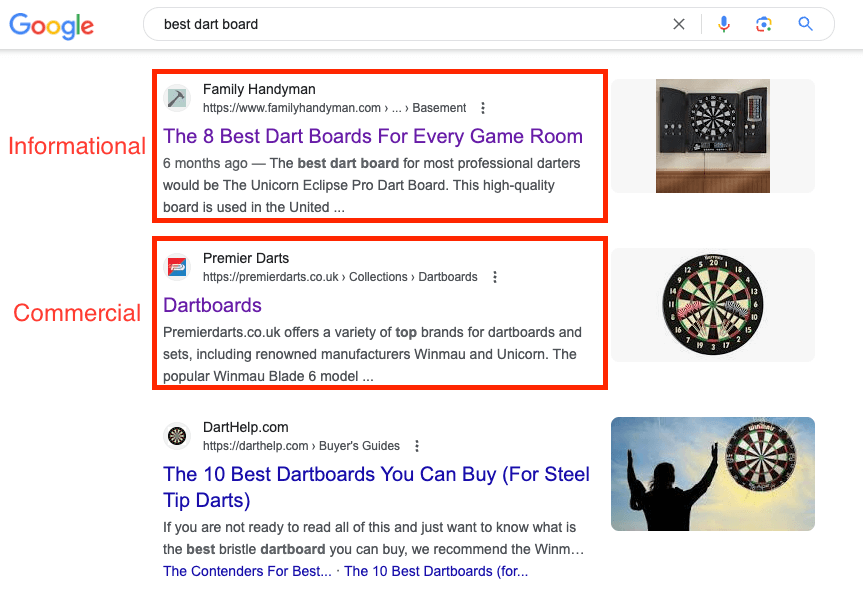
The negative consequences of keyword cannibalization
As mentionen previously, keyword cannibalization can have some serious negative effects on your SEO without you even noticing that there is a problem.
In some cases you’ll see that you have 2 results shown in SERP ranking #7 and #8.
Not too bad, right?
Double visibility enhancing the chances of getting a visitor.
This is an issue though – and chances are that you haven’t realized the issue yet or that you have just noticed it hence you are reading this post.
The practical effect in this case is that you would likely have a higher Google ranking if you have had just a single authoritative page for this keyword.
So, instead of 2 pages ranking #7 and #8 you might miss out on having just a single page ranking #3 which would likely get you a better CTR and more traffic.
You are missing out on traffic, probably leading visitors (unintentionally) to the wrong page, see more rank fluctuations and other issues.
But why is that? Let’s dig into it.
You’re splitting the page authority

When you have 2 or more pages targeting the same keyword with the same intent, you have practically created an additional competitor which is yourself.
Your pages are competing for the ranks in SERP and first of all Google isn’t necessarily ranking the correct page higher which leads visitors – potential leads – to the wrong page.
Next issue is that the 2 pages now have to share the authority of this subject which divides the authority in to 2 and both of your pages are ranking lower than they would if you have just had a single page.
Does it makes sense?
If not, let’s take a simple example to provide some context.
Say, you are going to your local book store.
Looking at the books in stock about the subject you are looking for; what would you chose?
A single book covering the whole subject, or multiple books about the subjects that might overlap in content for big parts of the books?
You would likely chose the single book option with all of the information in it rather than reading 3 books that is roughly about the same.
This is how Google would rate your multiple landing pages targeting the same keyword and none of them will be the best result for Google to show the user as there is other sources with all of the content on just a single page – because that is what users want. Online as well as in the book store.
Sharing backlinks and similar anchors
When it comes to SEO, links are still an important factor. When you are trying to rank 2 pages for the same term, you are forced to split the link value and build backlinks for both pages.
The result: you’ll have 2 mediocre pages based on backlinks instead of one strong authoritative page.
Building, say, 15 links to one page and 20 links to another page could have been targeted just a single page receiving 35 backlinks and a lot better performance in Google Search.
As you haven’t produced 2 similar pages, one of the multiple pages will be the more comprehensive one which you would likely prioritize more anyway – and is more likely to get “natural” incoming links.
Lastly, you will use the same anchors for internal as well as incoming external links for both pages leading visitors and Google to different sources for the same subject leading to wrongly ranked pages and sending potential leads to the wrong page and miss out on a lead.
Google will get it wrong
![]()
Google is complex and is backed by a strong and clever set of algorithms. The use regarding keyword cannibalization is that Google still understand what pages are about based on content. Based on keywords.
If you are in a reality where all of your pages are targeting the same keyword then Google will try to understand the content and rank the pages that they guess is the best fit for the search query.
If your content is too similar and/or matching the same intent, there is a 50/50 chance that Google picks the wrong page to display which leads to lower CTR, lower conversions and lower traffic numbers.
Do not rely on Google being smart and hope they will pick the correct page.
Do not give Google that dilemma to chose between.
Take control of your website and take the decision yourself rather than expecting Google to pick the right page.
Waste of crawl budget
When it comes to Google crawling and indexing your landing pages, they are working with a so called crawl budget.
What is that?
A crawl budget is the number of times that Googles crawler visits your website in a certain time period.
When you have multiple pages targeting the same keywords you are basically wasting the crawl budget for your site.
Why should you care?
The most critical here is that you potentially ends up with your most important page not being indexed at all, hence it will not be displayed in the SERP.
With the Google Core Update from March 2024, we have seen that Google is not only “punishing” bad content, affiliate sites etc.
Our experience also shows that Google are holding back on crawl budgets.
Way less landing pages are being indexed amongst our users which is just another reason to only publish quality pages – and only 1 page per keyword.
The bigger a website, the more careful you need to be looking into crawl budget to make sure that your important content pages are being indexed.
How to identify keyword cannibalization issues
There is several ways of identifying keyword cannibalization and it differs from tool to tool which features are available to help your identify affected pages.
How to identify keyword cannibalization using Morningscore
Identifying content issues with keyword cannibalization is quite simple but it takes a little more than just looking at a keyword.
First of you need to signup for Morningscore (14 days free trial – no credit card required).
Now, let’s look at how to identify keyword cannibalization step-by-step:
- From your “overview” click on the button “see all keywords”.
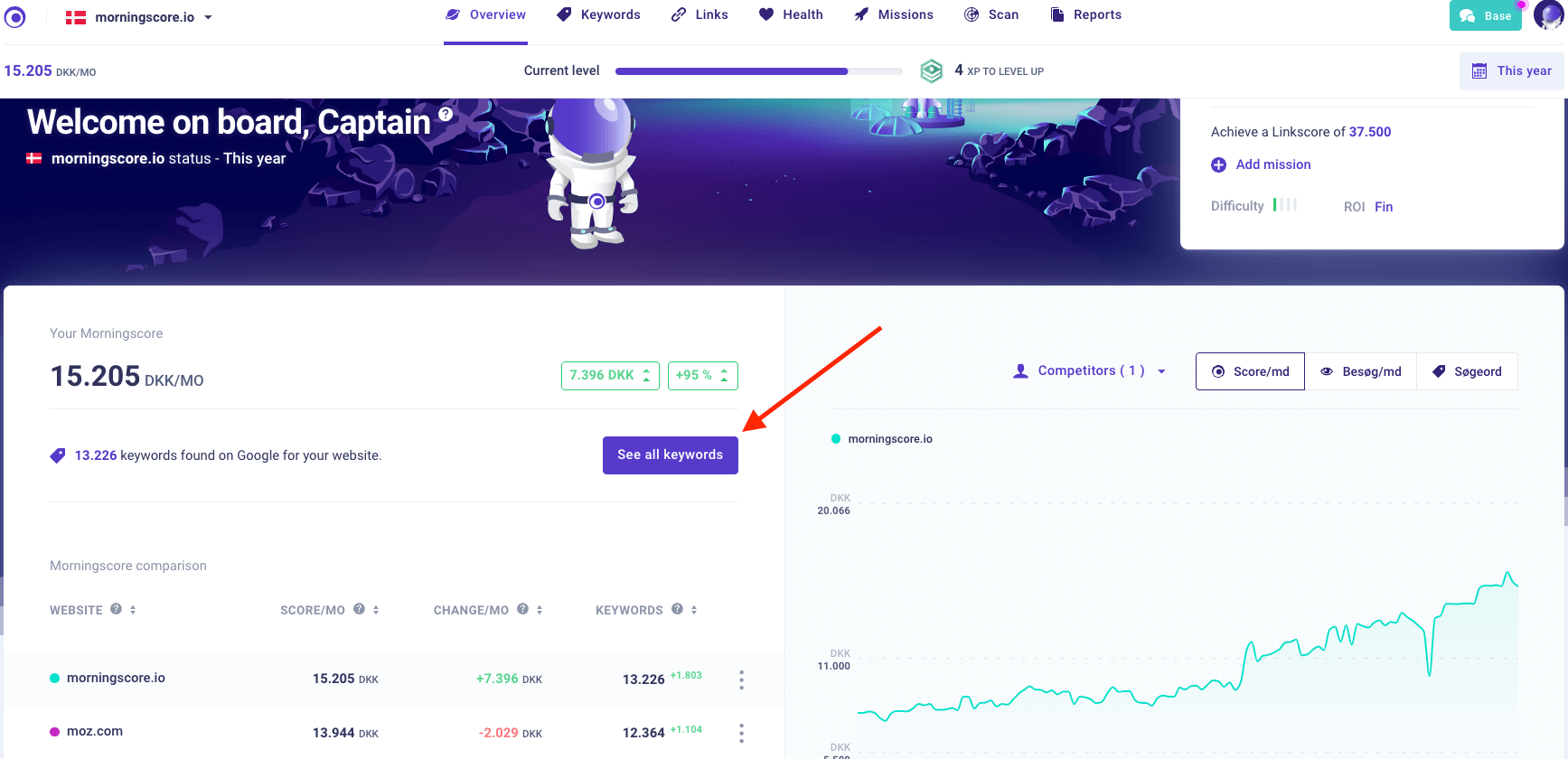
- Find your most important or valuable keywords that your are currently ranking on and add them to your rank tracker.
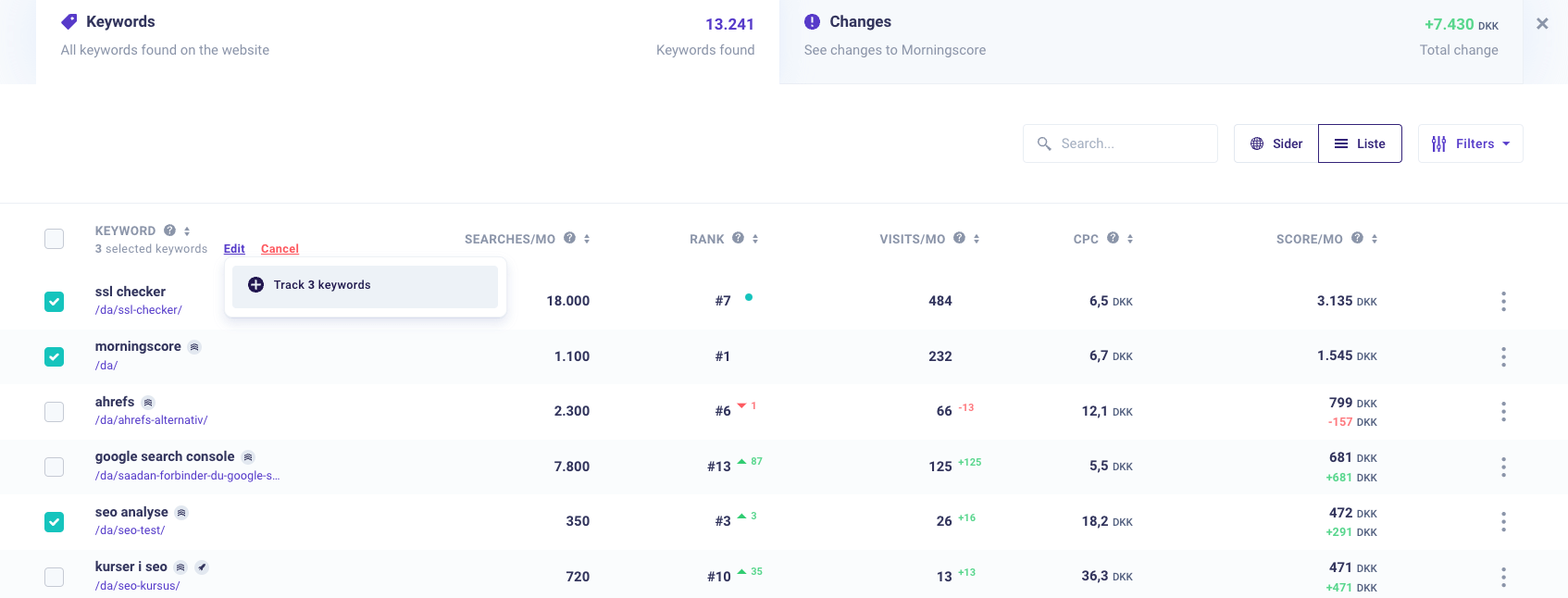
- Navigate to the keyword rank tracker, find your keyword and click “see keyword history”
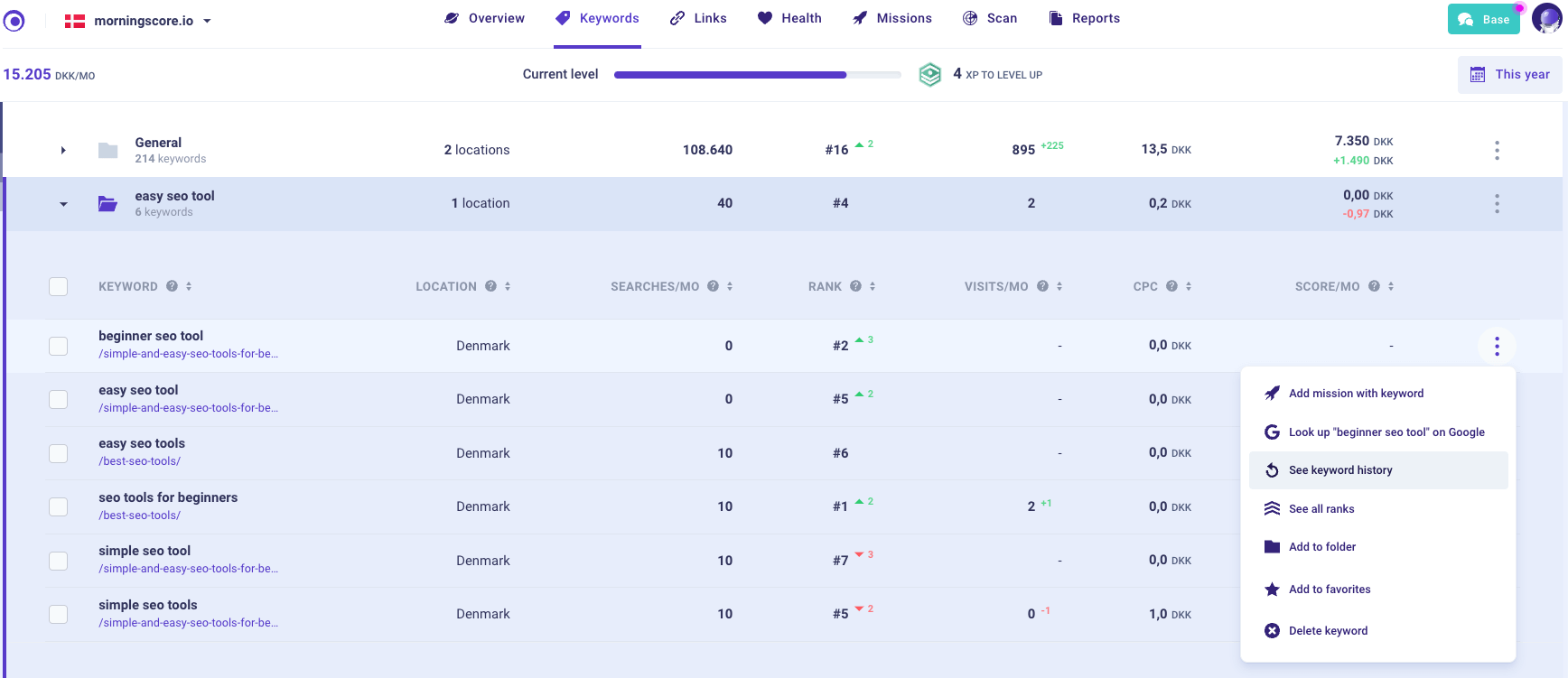
- Check if the landing page changes over time
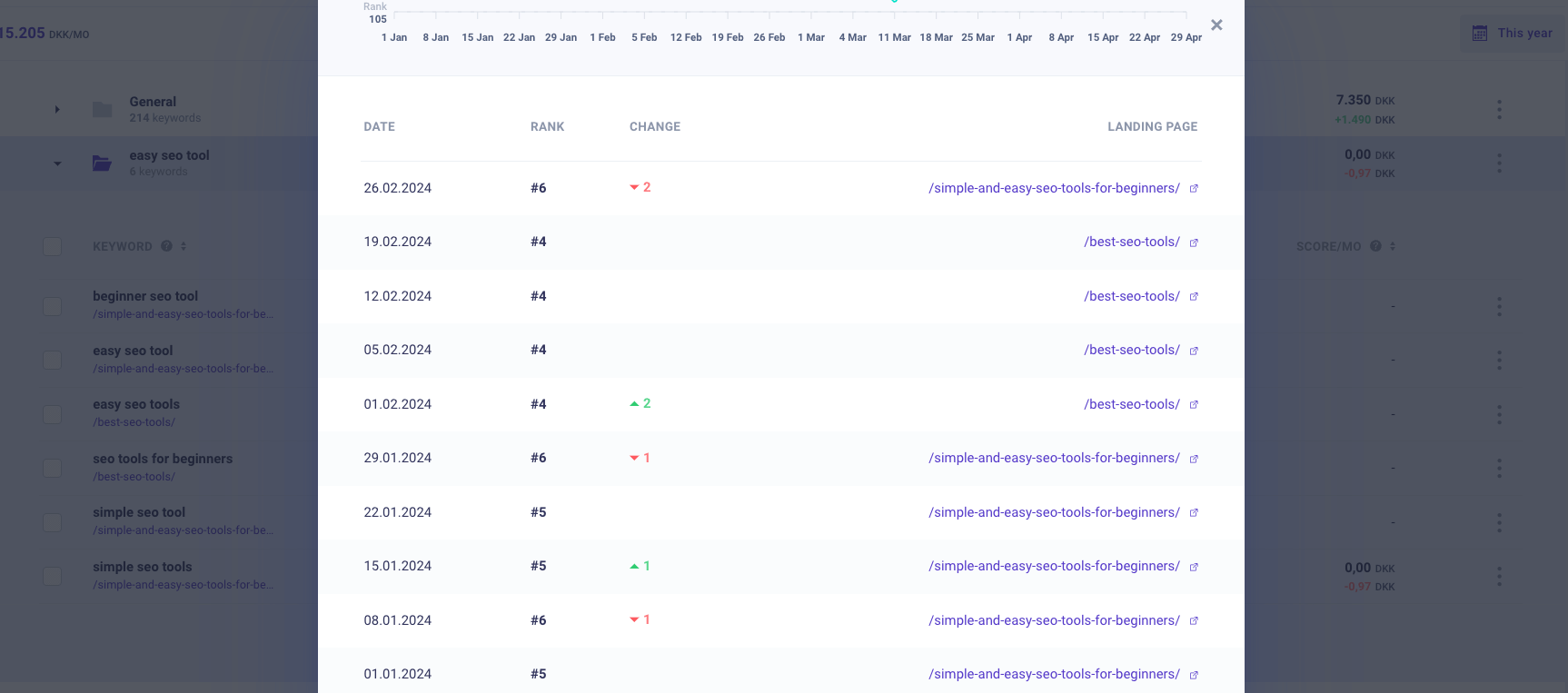
Following the steps above is just one of the ways to identify whether you have issues with keyword cannibalization for your keyword.
In the example shown with the steps I am looking at the keyword “beginner SEO tool“.
Looking at the rank history for that keyword reveals that the top ranking landing page was /simple-and-easy-seo-tools-for-beginners/ which changed to be /best-seo-tools/ and then back to /simple-and-easy-seo-tools-for-beginners/.
The fact that the top ranking page is changing reveals that I have potential issues with keyword cannibalization. It shows that I have 2 competing pages which Google have had issues choosing between which one to display in SERP.
Another way of checking is even more simple, but only gives you an overview of the current situation today.
By looking at all of your keywords in Morningscore you will se a landing page under every keyword ranking within top 100 on Google.
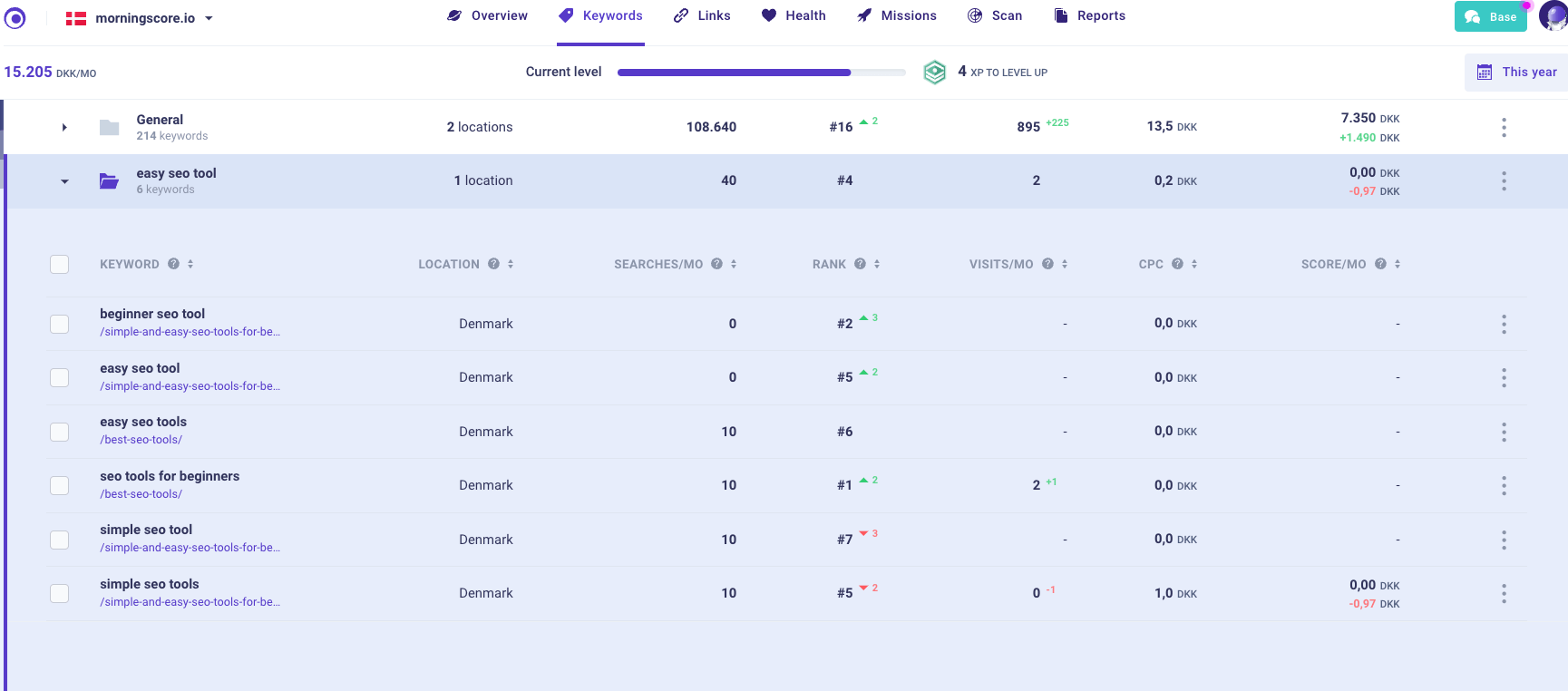
I’m often asked by Morningscore users how they can change the landing page for a keyword.
The answer is: You can’t.
You can’t edit and change the landing page shown for a keyword in Morningscore. The landing page shown below the keyword is the highest ranking landing page by the latest update (daily updates for tracked keywords).
So, if you see a “wrong” landing page it’s most likely because of keyword cannibalization.
Google have decided to rank a “wrong” page because you have more than 1 page relevant for the keyword and have tried to figure out which one is the best fit.
Sometimes they are wrong.
How to identify keyword cannibalization using Google Search Console
If you are looking for a free tool to help you detect issues with cannibalization issues you can use Google Search Console.
- Go to your Google Search Console-account. If you don’t have on, you can follow our Search Console guide here.
- Click “search results” in the menu below “performance”
- Find a keyword to check, click on it and a filter will display in the top
- Click “pages” to see the URLs getting clicks and impressions
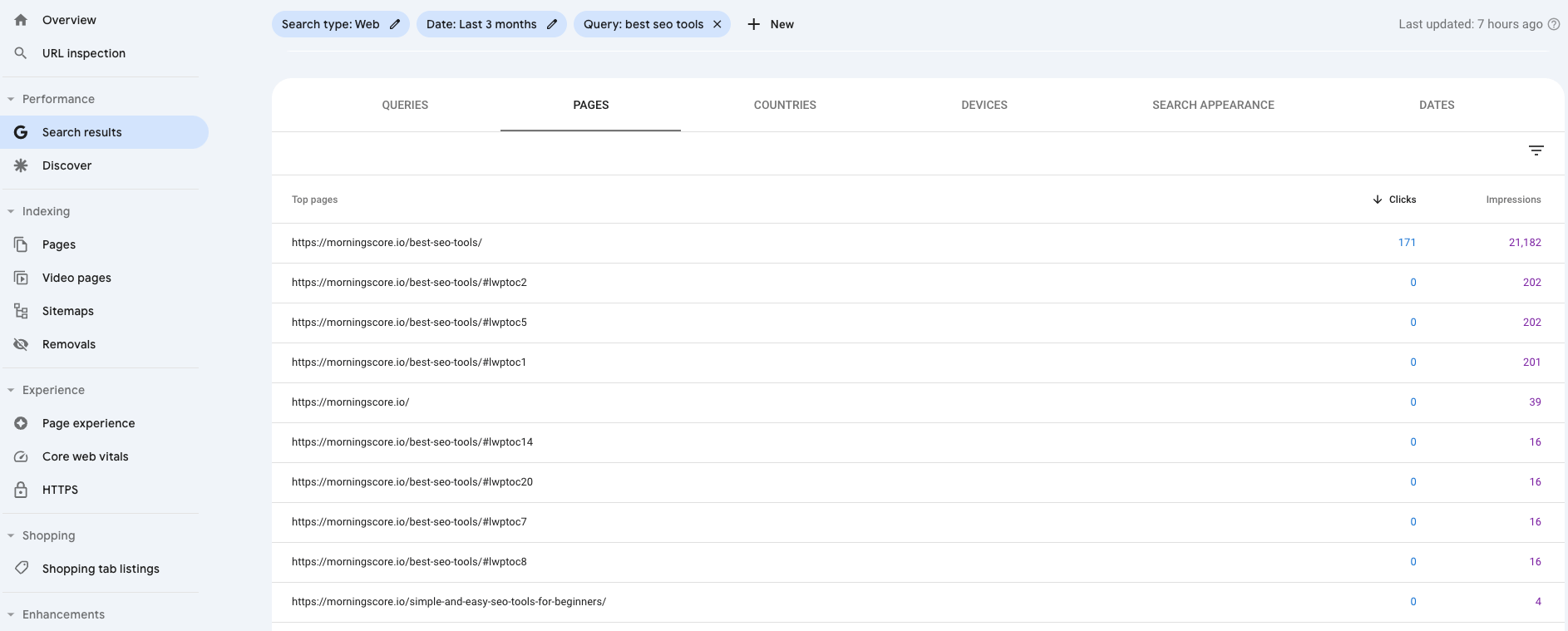
If there is more than 1 URL chances are that you have some issues with keyword cannibalization.
If more than 1 URL is getting hits, it means that more than one pages is or have been displayed in SERP.
You should look into every page and analyze the search intent. If they have overlapping search intent that is an issue and you should edit the “wrong” page not to match the same search intent.
How to manually identify keyword cannibalization
You can even check and analyze for keyword cannibalization without any SEO tool. To find overlapping pages, you need to navigate go Google and do the following:
Search: “site:domain.com keyword”. By making this command you ask Google to show you all the pages on the domain ranking that are ranking on the keyword.
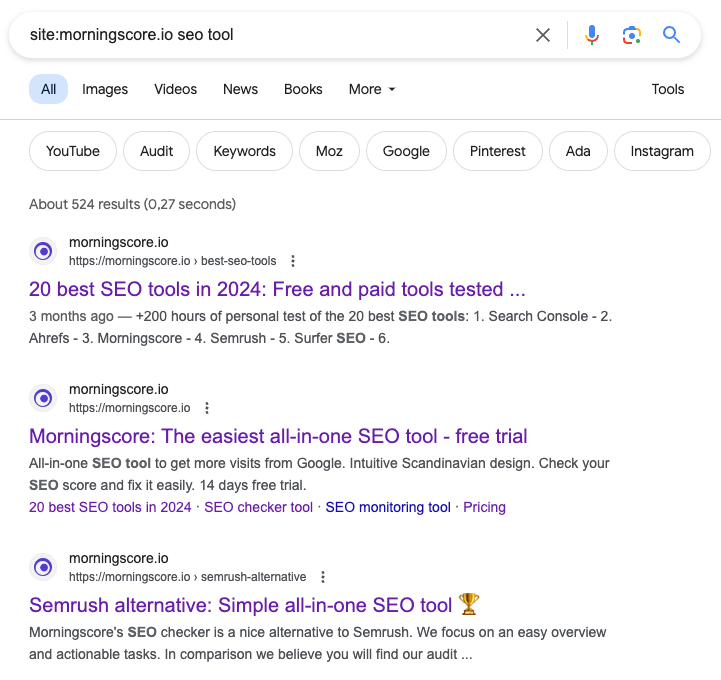
Analyze the results and check if any of your pages seems to overlap, directly targeting the same keyword or targets the same search intent.
If you have keyword cannibalization issues we’ll look into how to deal with it next.
How can you fix keyword cannibalization issues?
A single fix that resolves problems regarding keyword cannibalization doesn’t exist. It takes a little testing of different things to straighten out things.
Optimize internal links
This is always my go-to solution to fix keyword cannibalization in cases where Google simply ranked the wrong page highest.
Google have tried to pick the best fit, but sometimes they are wrong. To help them understand the hierarchy of importance you can link internally on your website to the correct page on the keyword anchor.
This way you are telling Google across your websites that queries around that subject should lead to that page – the page you refer to yourself.
To identify internal link oppourtunities, you can simply do a “site search” on Google like this:
site:domain.com keyword
With the command above you’ll see all the pages thar are somewhat ranking for the keyword. These are the main pages that should definitely link to you favored page. Go to every page and link to the right page from them.
Update your content / merge pages
If multiple pages ranks for the same keyword, it means that you have either similar content or content targeting the same search intent on the same subject.
This causes problems for you, hence you should decide which page is the best fit.
From here you should consider whether the other pages adds any value as stand alone or if you could benefit from adding that content to the main page, delete the page and redirect it and merge the two to one single comprehensive page.
If that is not an option, you should rewrite and re-target the content even more specific towards their subject and keep them “on their own path”. Use the affected keyword less on the page and make sure the intent of the page is for a different query.
Let’s take an example:
If you have 2 pages currently ranking for “outdoor shoes” you can choose to keep both pages but update the “wrong” one for “hiking shoes” instead as a sub-category to the main category “outdoor shoes”.
This way you keep both landing pages and target 2 different keywords instead of competing for the same.
Re-structure your site hierarchy
Another solution you can try is to re-structure your site. This can be a simple operation or very tricky depending on your current structure.
To help Google understand the hierarchy you should set your main page as the top of the pyramid and the other related pages below it as submenus.
Create an umbrella with your main page on top and make it authoritative and top of hierarchy.
301 redirects, canonicals & noindex
This solution should be the very last step and only if nothing else is working. Generally, these solutions aren’t recommended as it is not a real solution but rather a quick fix.
If your cannibalized content keeps competing against each other and your most authoritative page is suffering you can choose 1 of the 3 following things:
- 301 redirects: By redirecting the least authoritative page you consolidate the 2 pages on the primary page. This will permanently move the secondary page and you won’t get any value from that one. Your primary page can potentially increase but no guarantees.
- Canonical: If the content on the 2 pages are very similar you can, instead of just redirecting it, keep the page online (you might use it for lead generating and your primary page for purchase conversions) you can add the canonical tag to the page and tell Google that this page is a copy of the primary page
- Noindex: To remove the page from Googles index ad prevent it from showing in SERP, you can set the page to noindex. This way you will keep having the page online, users can access – again, you might use the page or see good conversions from existing website traffic when they visit this page).
Conclusion
In conclusion, resolving issues of keyword cannibalization is crucial for maximizing the effectiveness of your website’s SEO efforts.
By understanding what keyword cannibalization is and its negative consequences, you can take proactive steps to identify and address these issues.
Using tools like Morningscore and Google Search Console can help you pinpoint instances of keyword cannibalization, while manual methods provide additional insights.
Once identified, implementing solutions such as optimizing internal links, updating or merging content, and restructuring your site hierarchy can effectively mitigate keyword cannibalization.
By taking these steps, you can streamline your website’s SEO efforts, improve search engine rankings, and ultimately drive more traffic and conversions.












